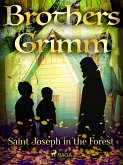The Temptation of Saint Anthony Gustave Flaubert - "The Temptation of Saint Anthony (Historical Novel)" is formatted for your eReader with a functional and detailed table of contents.The Temptation of Saint Anthony is a historical novel. It takes as its subject the famous temptation faced by Saint Anthony the Great in the Egyptian desert, a theme often repeated in medieval and modern art. It is written in the form of a play script. It details one night in the life of Anthony the Great where Anthony is faced with great temptations, and it was inspired by the painting, which he saw at the Balbi Palace in Genoa.Gustave Flaubert (1821-1880) was an influential French writer who was perhaps the leading exponent of literary realism of his country. He is known especially for his first published novel, Madame Bovary and for his scrupulous devotion to his style and aesthetics. The celebrated short story writer Maupassant was a protégé of Flaubert.
Dieser Download kann aus rechtlichen Gründen nur mit Rechnungsadresse in A, B, BG, CY, CZ, D, DK, EW, E, FIN, F, GR, H, IRL, I, LT, L, LR, M, NL, PL, P, R, S, SLO, SK ausgeliefert werden.









